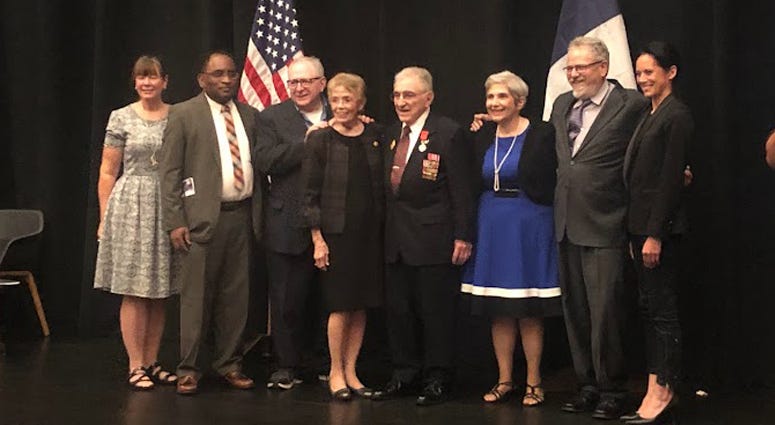
A North Texas man who was born in Germany and moved to France during Nazi control has been awarded the Legion of Honor, France's highest civilian accolade. Ralph Hockley, 96, accepted the award at the Dallas Holocaust and Human Rights Museum.
"I want to thank France for this honor which is totally unbelievable," Hockley says.

Hockley's family moved to Marseille when he was nine years old. He worked with war aid collection efforts and, at 14, began working as a volunteer interpreter with the American Quakers. Hockley was fluent in French and German.
"At 14 and 15, I helped refugees, and I became the liaison between one of the Quakers and American consulate at a time when people were standing in line by the hundreds in front of the American consulate," he says. "I was able to do research for people in concentration camps."
Hockley's own father spent time at a concentration camp. In 1941, the Quakers negotiated for his release and helped his family get immigration visas and move to the United States.
"At the end of this chapter of your life, you could have taken advantage of the refuge offered to you by the United States, far from the barbarism which was unleashed in Europe," says Valerie Baraban, consul general of France in Houston. "But your courage and your sense of duty continued to guide you."
On Hockley's 18th birthday, he reported to his draft board and started active duty with the U.S. Army December 29, 1943. Hockley arrived in Europe in April 1945 and was in Paris on VE Day, May 8, 1945.
"I'll tell you one sentence: Freedom is not free," he says.
Hockley continued working with the U.S. Army and was deployed to Korea in 1950. There, he was an artillery forward observer and supported the French Battalion of United Nations forces, which was attached to the 2nd Infantry Division.
"To me, World War II and the Korean War were two wars which wound up with a just ending," he says. "South Korea, when I got there, was the pits. People lived in shacks and huts. If you go to South Korea today, it's one of the most modern countries in the world. What they've done is just unbelievable. That's why, when people say, 'We didn't win the Korean War,' I can assure you we won the Korean War. The fact North Korea is still hanging on doesn't change the fact that South Korea is free. They are free, and every South Korean I meet, when they find out I was in South Korea in 1950, they practically genuflect and say, 'Without you, I would never have had my freedom.'"
Because of his service, Baraban came to Dallas to award Hockley the Legion of Honor, but Hockley says the fight against persecution never ends, saying other parts of the world are still dealing with religious oppression today. He says America grows stronger by welcoming those refugees.
"The Holocaust Museum, the more people they can make understand what the alternative is to freedom from persecution, the more valuable their effort," Hockley says.
"He went through unspeakable horrors but somehow managed to go on with life and to exhibit bravery," says Mary Pat Higgins, president and chief executive officer of the Dallas Holocaust and Human Rights Museum.
Higgins says 125 Holocaust survivors moved to North Texas. She says telling stories like Hockley's can help younger generations understand the importance of history.
"It really helps us realize and think about what it would have been like if that had happened to us," she says. "That's when you can really start to learn from history and change your behavior going forward."
"Just the fact I could do this at 14 and 15, to me, is a suggestion to young people they should never think they are too young to do something important," Hockley says.
LISTEN on the Audacy App
Sign Up and Follow NewsRadio 1080 KRLD

